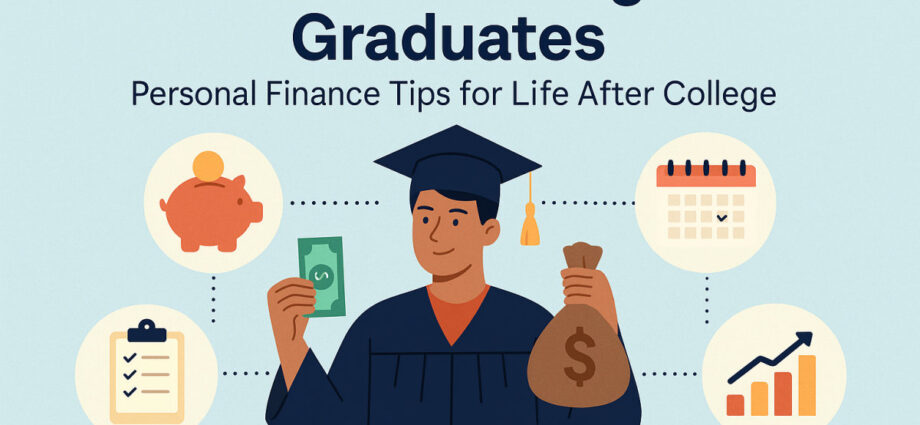Personal Finance Tips for Life After College
Hey there, future graduate — congrats! You’ve made it through lectures, finals, and way too many late-night study sessions. Now, as you get ready to trade your cap and gown for a paycheck and a new routine, it’s time to talk about something just as important as your degree: your money.
Getting your finances in order might sound overwhelming, especially with student loans looming and dreams of independence ahead. But don’t stress — financial planning is all about taking small, smart steps. Let’s break it down together.
Step One: Know Where You Stand
Take a Snapshot of Your Finances
Think of your finances like a road trip — you need to know where you’re starting before you can figure out where to go. So first things first: add up what you owe (like student loans and credit cards) and what you own (savings, checking accounts, maybe even a car or investments). This gives you your net worth — basically, what’s left after subtracting your debts from your assets.
If it’s a negative number, don’t panic. Most grads are in the same boat. What matters is knowing where you are so you can make a plan to move forward.
Step Two: Set Goals That Actually Mean Something
What Are You Working Toward?
Are you hoping to wipe out student debt in five years? Save up for your first apartment? Build a cushion in case life throws a curveball? All of these are great goals — just make sure they’re SMART:
- Specific
- Measurable
- Achievable
- Relevant
- Time-bound
This isn’t just about writing a to-do list. It’s about giving yourself direction and turning vague dreams into actual plans.
Step Three: Build a Budget That Works for You
How to Make Your Money Make Sense
Budgeting doesn’t have to mean cutting out all the fun stuff. It’s just a way to track what’s coming in, what’s going out, and how to stay in control. Start by listing your income — think salary, side gigs, anything else. Then break down your expenses:
- Needs: rent, groceries, utilities
- Wants: restaurants, streaming services, that weekend getaway
Once you see the full picture, you can spot where you might overspend and make room for savings or loan payments. And hey, life changes — so your budget should too. Stay flexible.
Budgeting Made Easy: Try an App
There are tons of apps out there that take the guesswork out of budgeting. Some link to your bank accounts, categorize your spending, and even send alerts when you’re getting close to your limits. Try a few and see what fits your vibe. You might even start to enjoy checking your money.
Step Four: Tackle Student Loans Without Losing Sleep
Know Your Repayment Options
Student loans are a reality for most grads — but they don’t have to be scary. Federal loans offer several repayment plans, from fixed monthly payments to ones based on your income. Each has pros and cons depending on your job, salary, and future plans. Take some time to learn what fits best.
Want to Pay Off Loans Faster? Here’s How:
- Pay more than the minimum when you can — even a little adds up.
- Look into refinancing if you qualify for a lower interest rate.
- Explore forgiveness programs if you’re going into public service or teaching.
Whatever route you choose, the goal is the same: stay in control and avoid falling behind.
Step Five: Start Saving (Yes, Now)
Build an Emergency Fund First
Before you think about investing, make sure you’ve got a safety net. Aim to save at least 3–6 months’ worth of expenses. This fund is there for those “just in case” moments — like car repairs, medical bills, or job changes. Start small if you need to. Just start.
Dip Your Toes Into Investing
Once you’ve got some savings built up, it’s time to think long term. Investing might sound intimidating, but it doesn’t have to be. Learn the basics: stocks, bonds, mutual funds, ETFs — and consider starting with low-cost index funds or robo-advisors.
The key? Start early, invest consistently, and don’t chase quick wins. Let time and compound interest do the heavy lifting.
Step Six: Build Habits That Make Life Easier
Understand Your Credit Score
Your credit score can affect everything from renting an apartment to getting a job or a loan. It’s based on stuff like your payment history and how much credit you’re using.
- Pay your bills on time
- Don’t max out your credit cards
- Check your credit report regularly for errors
A good score can save you serious money in the long run.
Watch Out for Common Money Traps
- Living beyond your means
- Ignoring your savings
- Taking on high-interest debt
- Thinking you’ll “start saving later”
Stay mindful. Small choices today lead to big results down the road.
Step Seven: Plan for the Long Haul
Yes, Retirement Planning Starts Now
It might feel way too early to think about retirement, but the earlier you start, the easier it gets.
- If your job offers a 401(k), contribute to it — especially if they match. That’s free money.
- Look into IRAs (Traditional or Roth) for even more savings options.
- Set a goal for retirement and work backward from there.
Even if you’re only saving a small amount now, compound growth over time can turn it into a huge asset.
Protect What You’re Building: Get Insured
Insurance might not be exciting, but it’s a must. Think of it as a backup plan for your backup plan.
- Health insurance helps cover unexpected medical costs
- Life and disability insurance are important if others depend on your income
- Renter’s or homeowner’s insurance protects your stuff from theft or disasters
Make sure you’ve got the coverage that fits your life.
Final Thoughts: You’ve Got This
Financial planning isn’t about being perfect — it’s about being intentional. Start by knowing where you stand, set meaningful goals, build a budget that fits your life, and keep learning as you go.
You don’t need to do everything at once. Just take it step by step. Your future self will thank you.

